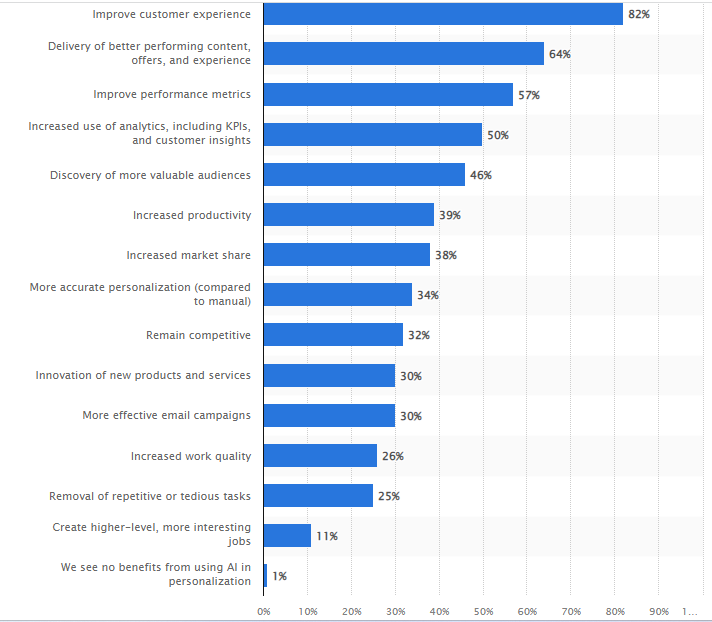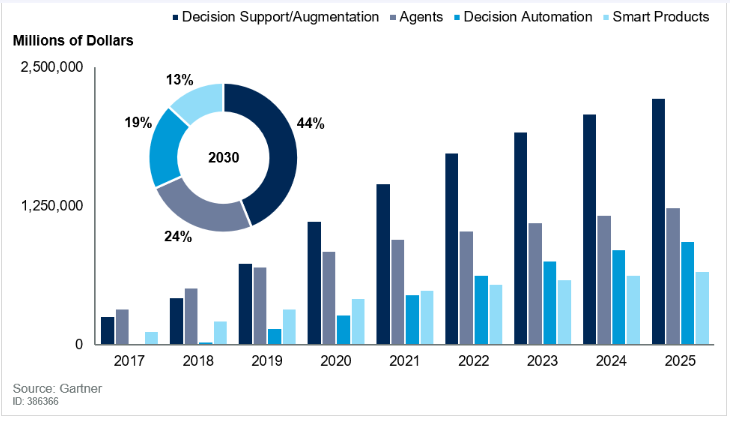Top 6 Ways AI (Artificial Intelligence) Will Transform eCommerce

While scrolling through your favorite online store, a personalized recommendation showcases the product you sought. You click on it, and the product is at your doorstep quickly, thanks to efficient delivery systems. How did this happen? The answer lies in the disruptive force of AI and machine learning that is revolutionizing the eCommerce industry like never before.
Gone are the days when AI and ML were confined to scientific research. They are transforming our everyday lives, making things more accessible and convenient. AI in eCommerce revolutionizing everything from personalized recommendations to chatbots that feel almost human. The benefits of AI and ML for eCommerce are tremendous. Not only are businesses realizing this, but the adoption rate of AI in eCommerce is skyrocketing.
80% of retail employees anticipate their companies to adopt AI by 2027. 51% of eCommerce businesses have already integrated AI into their operations, leveraging its power to enhance sales, marketing, and customer service.
Let’s take a look at several ways in which AI is going to affect the eCommerce industry.
Ways AI is poised to impact the eCommerce industry
AI is arming eCommerce businesses with unprecedented capabilities revolutionizing their value chains. Let’s explore the ways artificial intelligence has been unfolding this transformation.
Say It To Find It
The integration of AI in eCommerce has revolutionized how we search and shop online, with voice search playing a significant role. With AI advancements, voice assistants like Google and Siri can understand human speech and recognize our commands. According to Google, 20% of searches now utilize voice search. This game-changing technology has not only transformed how we interact with our devices but also how we shop.
Imagine effortlessly saying, “Hey Google, remind me about the meeting today at 4 pm,” and having a reminder set within seconds. Such seamless integration of AI and voice search has streamlined our daily tasks. AI-powered voice search has made a significant impact. Customers can now have a speak-browse-purchase shopping experience, eliminating the friction associated with traditional typing and clicking.
AI-driven voice search offers many benefits for eCommerce:
- Time Efficiency: Voice searches save customers precious time and effort by reducing the need to manually type and search for products. They can find what they’re looking for in a flash with just a few spoken words.
- Error Reduction: Typing errors can be frustrating, but with voice search, the chances of errors are significantly reduced. AI-powered voice recognition technology ensures accurate interpretation of customer commands, delivering precise search results.
- Enhanced Customer Experience: By providing a quick and effortless way to search for products, voice searches elevate the customer experience. The ease of speaking naturally and receiving relevant results fosters convenience and satisfaction.
- Hands-Free Shopping: Voice searches enable customers to browse and shop online without physically interacting with a device. This hands-free experience is particularly convenient when customers have limited mobility or when their hands are occupied with other tasks.
Personalized Shopping Recommendations
Use of AI for personalization in eCommerce has emerged as one of the top eCommerce industry trends in recent years. With AI, we can now enter a new shopping era customized to our preferences and needs. While offline shopping has excelled in providing a bespoke experience, AI is working towards replicating that level of personalization in the digital realm. According to Statista, there are numerous benefits and reasons to utilize AI in the retail industry.

Image source:- statista.com
AI can deliver personalized recommendations that align perfectly with individual preferences by analyzing customer shopping patterns and other data points. For instance, if you’re running a Magento 2 store, you can leverage AI algorithms to offer a size chart feature, ensuring customers choose the right fit and reducing the likelihood of returns.
Ultimately, incorporating AI in the eCommerce industry brings invaluable benefits, optimizing operations, improving customer experiences, and driving business growth.
- Upselling and Cross-selling Opportunities: AI analyzes customer data to identify opportunities for upselling and cross-selling. You can increase average order value and drive additional sales by recommending complementary products or upgrades.
- Fostering Customer Loyalty: Personalization creates a bond between customers and your brand. By consistently offering relevant and appealing recommendations, AI fosters long-term relationships, boosting customer retention and lifetime value.
- Supercharging Conversions: Tailored product recommendations have a powerful impact on conversion rates. By presenting customers with products they are highly likely to be interested in, AI boosts the chances of purchasing and driving revenue growth.
- Elevating User Experience: Delight your customers by providing personalized recommendations catering to their unique tastes and preferences. This creates a seamless and enjoyable shopping journey, increasing customer satisfaction and engagement.
- Empowering Data-Driven Insights: AI-powered recommendation systems generate valuable customer behavior and preferences data. This data serves as a goldmine of insights for businesses, enabling them to make data-driven decisions on inventory management, marketing strategies, and future product development.
Customer Support with AI-Powered Assistance
The impact of artificial intelligence in the eCommerce industry has been remarkable, particularly regarding enhancing customer support and engagement. One of the most innovative solutions for this challenge is intelligent AI-powered chatbots. These chatbots can assist customers with purchases, answer common queries, and provide immediate solutions to common problems, making them a valuable addition to any eCommerce business.
Leading eCommerce giants like Amazon and H&M already implement chatbots in their customer support systems to improve customer engagement, increase sales, and reduce costs. For example, H&M’s chatbot, integrated into Facebook Messenger, can help customers with product searches, provide outfit suggestions, and even process orders. Here are some of the unique benefits of using AI-powered chatbots in eCommerce:
- Reduced Cart Abandonment: Chatbots can proactively address customer concerns during checkout, reducing cart abandonment rates by resolving any issues or uncertainties in real-time.
- Multilingual Support: AI-powered chatbots can communicate with customers in multiple languages, breaking down language barriers and expanding the reach of eCommerce businesses to a global customer base.
- 24/7 availability: Unlike human support, chatbots can provide 24/7 support to customers, allowing them to get assistance any time of the day or night.
- Instantaneous Support: Chatbots can quickly solve general problems and answer common queries, reducing response times and increasing customer satisfaction.
- Scalability and Cost-effectiveness: Chatbots can handle multiple customers simultaneously, reducing the human resources required to handle customer support and lowering operational costs.
From Data to Dollars
By leveraging machine learning algorithms, AI demand forecasting empowers businesses to accurately predict supply chain costs and efficiently plan for seasonal fluctuations in product demand. This valuable capability contributes to enhanced operational efficiency and cost savings. According to Gartner’s projections, AI is expected to generate a staggering $2.9 trillion in value for companies by year-end, showcasing its immense potential. Additionally, AI is anticipated to boost global worker productivity by an impressive 6.2 billion hours.

Image source:- Gartner
For businesses seeking to harness the power of AI and implement transformative solutions, partnering with a reputable mobile app development company is crucial. It can provide the expertise and resources required to develop AI applications in eCommerce that drive growth and success in today’s competitive market.
Take the case of Amazon, the eCommerce giant. By leveraging AI-powered demand forecasting, they optimize inventory levels to meet customer demand while minimizing stockouts and overstocking. This strategic approach allows them to manage their supply chain and achieve substantial cost savings efficiently.
- Optimized inventory levels: AI enables businesses to strike the perfect balance between inventory quantity and customer demand, reducing excess inventory holding costs and maximizing working capital efficiency.
- Reduced stockouts: Accurate demand forecasting minimizes instances of stockouts, ensuring that customers can always find the necessary products. This leads to improved customer satisfaction and loyalty.
- Improved supply chain management: AI-powered algorithms provide real-time visibility into demand fluctuations, enabling businesses to optimize their supply chain processes, minimize bottlenecks, and enhance overall operational efficiency.
- Cost savings: By eliminating excess inventory, minimizing stockouts, and streamlining supply chain operations, businesses can achieve significant cost savings and improve their bottom line.
Shielding Your eCommerce Empire
AI’s unparalleled role in the eCommerce industry lies in fraud detection and security, providing real-time protection against fraudulent activities. By leveraging advanced algorithms, AI can analyze transaction patterns, customer behavior, and data points to swiftly identify and prevent fraudulent transactions, ensuring the safety and integrity of eCommerce platforms.
To strengthen platform security and establish customer trust, businesses must leverage expertise of efficient eCommerce application development services that prioritize advanced security measures. By doing so, companies can enhance platform protection and foster customer trust, ultimately bolstering their success in eCommerce.
For example, PayPal, a leading online payment platform, leverages AI-powered fraud detection systems to safeguard its users’ financial transactions. By continuously monitoring and analyzing vast amounts of data, they can promptly detect suspicious activities, prevent fraudulent transactions, and provide secure payment services to their customers.
- Real-time fraud prevention: AI algorithms can detect fraudulent activities in real-time, preventing unauthorized transactions and protecting businesses and customers from financial losses.
- Enhanced customer trust: Using AI-powered fraud detection systems, eCommerce platforms can establish a secure customer environment, fostering trust and confidence in the platform’s integrity.
- Data-driven insights: AI’s ability to analyze vast amounts of data allows businesses to gain valuable insights into fraud patterns and trends. This knowledge can help them develop proactive strategies to stay ahead of emerging threats.
- Reduced manual effort: AI-powered fraud detection systems automate the process of monitoring and analyzing data, reducing the need for manual intervention. This enables businesses to allocate resources more efficiently and focus on other critical aspects of their operations.
Revolutionizing with AR
Augmented Reality (AR) is set to reshape the way customers shop by offering immersive experiences. Through the technology, shoppers can virtually try on products, gaining a lifelike understanding of how items look and fit within their daily lives. This innovation empowers customers to make well-informed purchase choices, enhancing their confidence in online shopping.
Imagine browsing for furniture and using AR to visualize how a couch would complement your living room’s decor or virtually trying on different pairs of sunglasses to see which suits your style. This level of interactivity bridges the gap between online and in-store shopping, providing a dynamic and engaging environment.
This merging of AI and AR elevates customer satisfaction and reduces the chances of returns due to mismatched expectations. As this technology continues to evolve, retailers across the eCommerce landscape will likely adopt AI-driven AR to create a seamless and captivating shopping experience that aligns with the preferences and needs of modern consumers.
Conclusion
Artificial Intelligence (AI) has evolved beyond its experimental origins and has become an instrumental technology that offers immense potential to simplify and improve various aspects of our lives. When implemented effectively, AI in eCommerce can significantly reduce human effort and enhance convenience.
If you’re not already using AI to help run your business, now is the time to start. Finoit Technologies is a trusted provider of custom software development services specializing in eCommerce app development.
With a strong track record of successfully delivering mobile apps to clients worldwide, we have also played a pivotal role in supporting entrepreneurs throughout their startup journey. Collaborating as a technology partner, we help bring their product ideas to life. For any inquiries or questions, please contact us at info@finoit.com.
We look forward to assisting you with your unique requirements.
Frequently Asked Questions
How does AI contribute to enhancing supply chain management in e-commerce?
AI plays a vital role in enhancing different areas of the supply chain, including inventory management, demand forecasting, and logistics planning. Businesses can use AI to optimize their supply chain operations, cut down on expenses, and achieve quicker order fulfillment.
How does AI facilitate the use of virtual assistants in e-commerce?
AI-powered virtual assistants make use of natural language processing and machine learning techniques to comprehend and address customer inquiries effectively. They provide personalized assistance, making the shopping experience more convenient and hassle-free.
What advantages does AI offer for pricing optimization in e-commerce?
AI-driven pricing algorithms take into account factors like market trends, competitor pricing, and customer behavior to dynamically adjust prices. This approach maximizes profits for businesses and helps them maintain competitiveness in real time.


